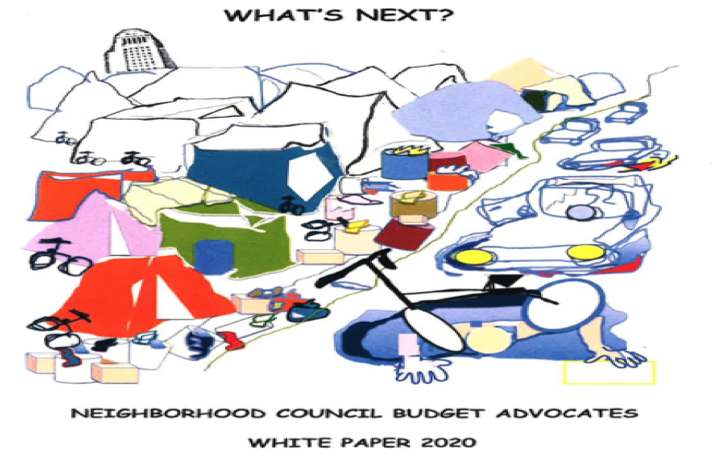BUDGET ADVOCATES-On January 27, the Budget Advocates published their 2020 White Paper “Radical Transparency” calling for more openness and transparency at City Hall, especially with regards to the choices by which they choose to spend the people’s money.
It starts off:
The Neighborhood Council Budget Advocates (as well as many Angelenos) are losing confidence in Mayor Garcetti and the City Council because of the recent disclosure of budget deficits that exceed $1.2 billion and the lack of transparency into the City’s budget process and labor agreements.
On July 1, 2019, the City announced that the budget was balanced. The City projected a budget surplus in each of the next four years, topping out at $78 million in 2024. The four-year cumulative budget surplus was projected to be $200 million.
Now, despite record revenues, the City is projecting deficits. This year’s budget deficit is estimated to be approximately $200 million. The City is also projecting budget deficits ranging from $200 to $400 million for each of the next four years. The four-year cumulative deficit is estimated to be $1.2 billion, an average of $300 million a year.
Since these paragraphs were written, the projected deficits have mushroomed due to the impact of the coronavirus that was already affecting Wuhan but had not yet become the pandemic that swept around the world just a few weeks later.
An impact that included not only the cost of protecting Angelenos from the virus but also the severe blow to the economy and to the City’s economically sensitive revenues.
And the City Council has done nothing constructive to address the underlying issues.
The preamble to the heart of the White Paper continues:
These deficits are largely attributable to salary increases for sworn (police and fire) and civilian employees pursuant to new labor agreements that were not included in the Adopted Budget. These agreements were negotiated behind closed doors without any input from the public. Furthermore, the approval of these new labor agreements was ramrodded through the Personnel Committee and the City Council without any meaningful discussion or disclosure.
These actions did not go unnoticed by other parties and, in fact, drove some of the rage that led to the demands of the People’s Budget. And the increased awareness that business-as-usual would no longer be accepted by those who call Los Angeles home.
The White Paper then looked to the future costs that the malfeasance of the City’s 2019-20 budget was asking Angelenos and their children to bear.
As a result of the Structural Deficit of $1.2 billion over the next four years and the need to balance the budget, Angelenos will experience a lower level of services, or a Service Deficit. At the same time, the City will be dumping on the next generations of Angelenos significant liabilities consisting of unfunded pension liabilities ($15 billion) and deferred maintenance ($10 billion). This is Intergenerational Theft.
Below are the recommendations made in January by the Neighborhood Council Budget Advocates. Despite last year’s budget not being tenable, despite the explosion of projected costs and other uncertainties associated with the pandemic, has the City taken steps to address, let alone implement, any of them?
In a word, NO.
The recommendations set out in the White Paper are more necessary than ever if we are to increase transparency into the City’s budget process and, as the author of the paper said: will hopefully mark the beginning of the process of restoring Angelenos trust and confidence in City Hall.
- Update the Four-Year Budget Outlook to reflect the current budget reality including the projected deficits.
- Require the Mayor to submit the budget to the City Council on or before February 1 rather than the current deadline of April 20. Each Department will then present its proposed budget and priorities to the appropriate City Council Committee. Afterwards, the Budget and Finance Committee will conduct hearings on each Department’s budget.
- All labor negotiations shall be open and transparent. Furthermore, the City shall solicit an independent opinion that analyzes the fiscal impact of any new labor contracts. Beginning 30 days after the release of the independent opinion and prior to approval, the City Council will conduct a series of public meetings to discuss the new labor contracts. Any new labor agreements shall not result in deficits.
- Create a Pension Commission to review and analyze the City’s pension and Other Post-retirement Employment Benefit (OPEB) plans and develop recommendations to eliminate the unfunded liability over time.
- Implement multiyear budgeting.
- Develop a ten-year infrastructure plan that includes, but is not limited to, streets, sidewalks, parks and their restrooms, trees, buildings, and vehicles. This will include plans for the Los Angeles River, the Civic Center, and the Convention Center.
- Benchmark the efficiency of the City’s Departments and operations.
- Implement a plan to increase the City’s Reserve and Budget Stabilization Funds to an amount equal to 10% of its General Fund Revenues.
- Establish an independent Office of Transparency and Accountability to oversee the budget and other related matters in real time.
- Develop solutions to balance the budget over the next four years and eliminate the Structural Deficit.
Over the next few weeks, we will look at all of these and how they played out to exacerbate the situation as the City faced mounting challenges, many of their own making.













